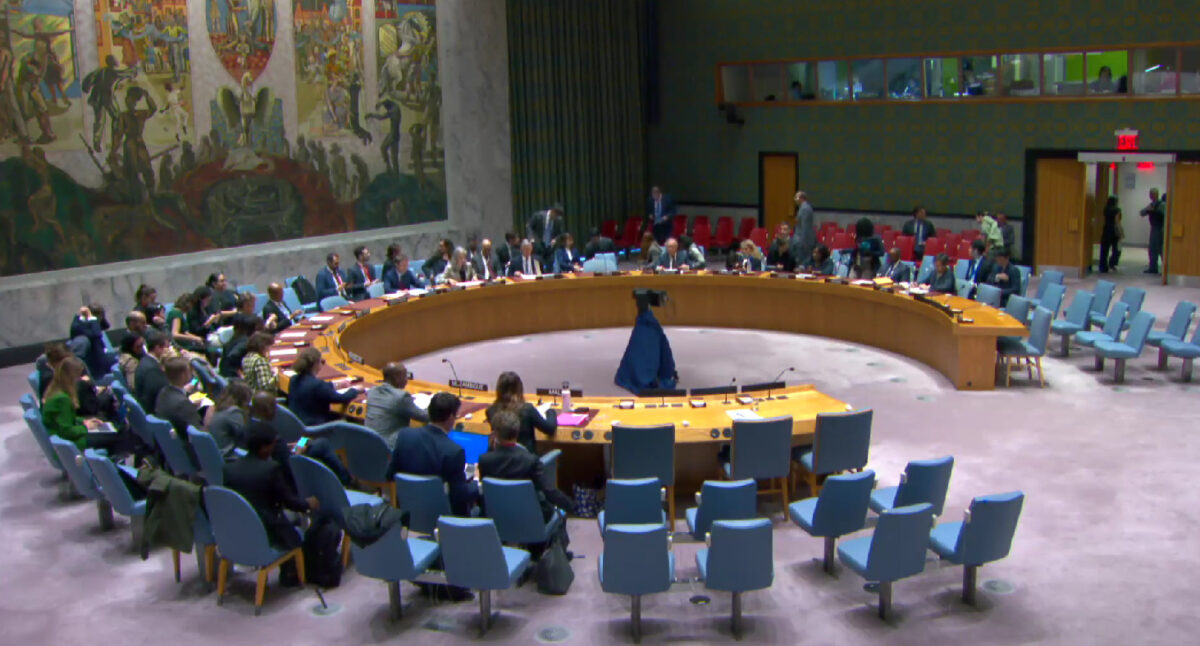The United Nations’ head of mission in Afghanistan Roza Otunbayeva briefed the Security Council on the situation in Afghanistan on Tuesday and said the UN’s engagement strategy has been significantly undermined by the more than 50 decrees that the Taliban has issued which are aimed at “eliminating women from public life and education.”
Otunbayeva’s question was whether to continue engaging with the Taliban despite these policies or to cease engaging because of them. She said UNAMA’s view is that the UN “must continue to engage and maintain dialogue, adding that dialogue is not recognition and engagement is not acceptance of their policies.”
“On the contrary, dialogue and engagement are how we are attempting to change these policies,” she said. However she noted that the “lack of trust on all sides is a serious impediment to building confidence but the doors of dialogue are still open.”
She did however emphasize the need for the resumption of “an intra-Afghan dialogue of the sort that was interrupted when the Taliban took power in August 2021.”
US representative Ambassador Robert Wood highlighted three topics in his remarks to the Security Council: The current situation of women and girls, access for humanitarian assistance, and ongoing human rights abuses.
He told the council that the restrictions on women and girls in Afghanistan “are absolutely indefensible” and that “Muslim majority countries have spoken out against these decisions and the United States is joining them in doing so today.”
He said the US calls on “the Taliban to roll back these restrictions and allow women and girls to have access to education which will enable their full, equal and meaningful participation in the society.”
He pointed out that women are essential actors in the distribution of aid and that it is imperative that they are allowed to continue their critical work with NGOs and the United Nations.
Increasingly difficult operating environment
Wood also stated the Taliban has created an increasingly difficult operating environment for partners who are staying and delivering life-saving aid to the people of Afghanistan. “Any interference in or diversion of humanitarian aid is totally unacceptable,” he said, adding that the US continues to “expect the Taliban to allow unhindered humanitarian access and the flow of aid, consistent with humanitarian principles.”
He went on to say that since August 2021, the US has provided nearly $2 billion in humanitarian assistance, including nearly $969 million to the World Good Program. He did however call on the international community to rally together and increase pledges and support to the humanitarian response.
“For our part, we will work with donors, multilateral development banks, and other partners to support sustainable interventions that create livelihood opportunities, including for Afghan women,” he said.
Referring to UNAMA’s report this month on killings, unjust detentions and disappearances of former government officials and security force members, he said the human rights abuses being carried out by the Taliban are “unacceptable. ”
“The Security Council members must continue to work together to press the Taliban to reverse their destructive course. Indeed, the Council must press the Taliban to engage in serious dialogue with the Afghan people to support their aspirations, to put an end to human rights abuses, and to allow assistance to reach those in need.”
Deliberate radicalization of youth
Also addressing the UNSC meeting was Naseer Ahmad Faiq, charge d’affaires of Afghanistan’s permanent mission to the UN as appointed by the former government. He said the Taliban’s “focus has been to identify the establishment of madrassas and religious schools, deliberately radicalizing the Afghan youth, and compromising their future and that of our nation.”
Since the Taliban takeover of Afghanistan, 15,000 madrassas have been established and at least 100,000 teachers have been recruited to these religious schools.
“It is our duty to liberate Afghanistan from the shackles of gender apartheid, radicalization and extremism, allowing our women, girls and youth to contribute to our society’s growth and prosperity,” Faiq said.
In turn, UK representative to the UN, Barbara Woodward, said the Taliban should be clear on the costs of their policies.
“International recognition should not be on the table. Sanctions relief should not come. And Afghanistan cannot be self-reliant when 50 percent of its people is excluded from society,” she said.
She added that “without inclusive governance in society, peace and stability will remain elusive.”





